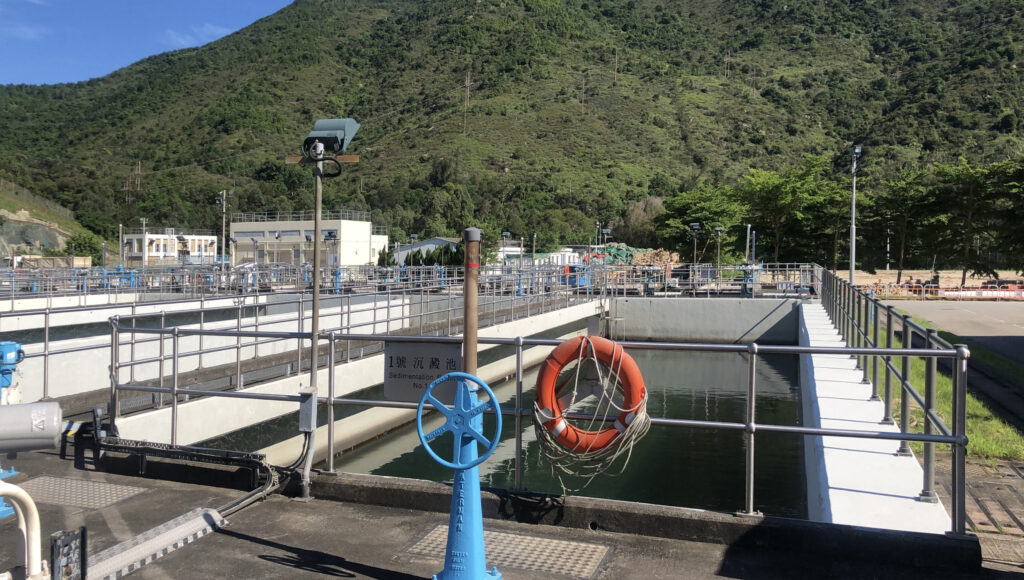A one-year PFAS study showing promising results
The Study
What: A one-year feasibility study to find the best solution for PFAS removal.
Where: Siu Ho Wan Water Treatment Works, for The Water Supplies Department in Hong Kong.
When: The study started in March and ends in June 2023.
Consulting firm WSP was looking for granular activated carbon to remove contaminants, namely PFAS and MIB from drinking water. This is a one-year feasibility study for the Water Authority in Hong Kong, a trial to find the best solution for PFAS removal. From Jacobi, Peter Yang (Business Development of Municipal Water), Eli Li (Sales Manager), and Hydro Ho (Technical Manager – Asia), has worked with the consultant since the start of the project.

Carbon loading to the filter.
Detecting the PFAS problem
Eli Li works in sales, covering Hong Kong for all applications and China for Air Filtration. She works closely with Hydro Ho, who is a specialist in municipal water.
“In Hong Kong, PFOA and PFOS are already on the watch list and the Water Supplies Department’s snapshot. When testing all the 20 PFAS in raw water in March 2021, there were less than 0.033 ug/l, which is well below PV of 0.1 ug/l in the revised EU DWD (EU Drinking Water Directive),” says Eli Li.
“The Water Supplies Department of Hong Kong plans to formulate a contingency plan to safeguard drinking water from emerging contaminants and odour problems by reviewing the feasibility of retrofitting existing filters with GAC, its implementation and performance. It includes comparison, the feasibility, performance and cost-effectiveness of GAC with incorporating advanced oxidation process and biological activated carbon process at water treatment works in removing PFAS and MIB in raw water,” Eli Li continues.

“The water authority in Hong Kong wanted a contingency plan to safeguard drinking water.”
Eli Li, Sales Manager Jacobi.
AquaSorb F23 outperforms others
WSP commissioned a Rapid Small Scale Column Test (RSSCT) to evaluate three agglomerated bituminous coals: AquaSorb 6300, AquaSorb 6400, a product from another carbon supplier and our proprietary product, AquaSorb F23. After six months of testing, the results showed that AquaSorb F23 outperforms others.
Based on their single point adsorption isotherm test result, AquaSorb F23 was selected to conduct the trial on retrofitting one anthracite filter at Siu Ho Wan Water Treatment Works with granular activated carbon for operational characteristics evaluation.

Siu Ho Wan Water Treatment Works.

Retrofit anthracite filter with AquaSorb F23.
Detecting the PFAS problem
Eli Li works in sales, covering Hong Kong for all applications and China for Air Filtration. She works closely with Hydro Ho, who is a specialist in municipal water.
“In Hong Kong, PFOA and PFOS are already on the watch list and the Water Supplies Department’s snapshot. When testing all the 20 PFAS in raw water in March 2021, there were less than 0.033 ug/l, which is well below PV of 0.1 ug/l in the revised EU DWD (EU Drinking Water Directive),” says Eli Li.
“The Water Supplies Department of Hong Kong plans to formulate a contingency plan to safeguard drinking water from emerging contaminants and odour problems by reviewing the feasibility of retrofitting existing filters with GAC, its implementation and performance. It includes comparison, the feasibility, performance and cost-effectiveness of GAC with incorporating advanced oxidation process and biological activated carbon process at water treatment works in removing PFAS and MIB in raw water,” Eli Li continues.

“This is the first installation of a PFAS grade in Asia, and it looks promising.”
Hydro Ho, Technical Manager Jacobi

AquaSorb F23 delivered to Siu Ho Wan Water Treatment Works.
This trial could become a benchmark for others
“As there are growing concerns about PFAS in drinking water and the non-availability of testing method for PFAS Total, The Water Supplies Department is considering the inclusion of all the 20 PFAS, Sum of PFAS and PFAS Total in their watch list. Besides PFAS, the GAC filter is installed to remove taste and odour, like MIB,” says Hydro Ho.
Hydro Ho continues: “If the one-year trial proves to remove PFAS and MIB effectively, The Water Supplies Department will replace the remaining seven anthracite filters with GAC. This is the first installation of F23 in Asia. If we see success in this project, and it looks very promising, the use of a more sustainable GAC like F23 will be a good reference for other municipal drinking water projects that have growing concerns about PFAS.”
The application AquaSorb F23
AquaSorb F23 is a high-performance granular activated carbon specifically manufactured for water treatment for human consumption in municipal applications. The manufacturing process of AquaSorb F23 uses a sustainable raw material and develops a unique pore size distribution of both micropores and mesopores necessary for the removal of complex substances like PFAS, POP and Taste and Odour molecules.
Read more about PFAS here
